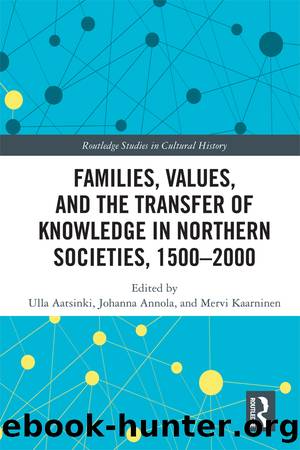Families, Values, and the Transfer of Knowledge in Northern Societies, 1500â2000 by Ulla Aatsinki Johanna Annola Mervi Kaarninen

Author:Ulla Aatsinki, Johanna Annola, Mervi Kaarninen [Ulla Aatsinki, Johanna Annola, Mervi Kaarninen]
Language: eng
Format: epub
Tags: Nonfiction, History, Scandinavia, Modern
ISBN: 9780429663468
Publisher: Taylor and Francis
Published: 2019-01-15T05:00:00+00:00
The Significance of Work
It was not only financial considerations that influenced choices. In the following section, I explore how education and work, and the link between them, were understood. What kind of an education was valued? What was regarded as important concerning working life? Some young people were rather bored with school after the eight years, and they were more than happy that the final year of compulsory schooling was drawing to an end. One boy described school as âtedious, every now and thenâ, and he said that he definitely preferred working to school. He had already worked as a messenger boy and a driverâs helper during the previous four summers (elementary schoolboy, number 71). One girl said it was âawfully niceâ to start working, although she liked school. The prospect of getting some money of her own made work appealing (elementary schoolgirl, number 17).
Educationalist Juha Kauppila (2002, 14) has researched the changing role of education in the twentieth century. He divides Finns born during the twentieth century into three groups. The first generation was born before the mid-1930s, and they received a meagre education. This led them to regard education as an ideal. The second cohort, born in the mid-1930s to mid-1950s, were a generation of increasingâbut unequalâeducation. For them, education was instrumental. The third cohort, born after the mid-1950s, was a generation of welfare and educational choices. For them, education had become self-evident. The significance of free time had increased at the expense of working life.
According to Kauppilaâs categorisation, the young people researched here belong to the second generation, for whom education was instrumental. Their parents represent the first generation. Educationâs instrumental role is clearly found in the vocational guidance documents, but it seems that the elementary school pupilsâ parents also adopted a very practical, non-idealised stance towards education. Desirable education had a clear connection to working life, and the parents did not value education per se: the elementary school pupilsâ families emphasised vocational schooling and vocational skills.
Working-class families have been noted to emphasise practical skills: theoretical knowledge was valuable only in clear connection to practical implications. This view contrasted with the middle-class familiesâ views, which valued knowledge because itâand, more importantly, qualificationsâwas a means of securing the class position and the aim for upward social mobility. Educationalists and psychologists were already paying attention to the straightforward attitude of elementary school pupils and their families to school and working life in the 1960s (Jauhiainen 2002, 236â237; Ball 2003). It closely resembles the attitude of the working-class âladsâ in Paul Willisâ (1979, 57â58) classical study, Learning to Labour, which focused on an industrial town in 1970s England.
The most important reason for the elementary school pupils to acquire more education was to aim for a more stable and secure position in working life. There were still plenty of jobs that did not require any vocational training. The disadvantage of these manual jobs was that one could not expect any increase in wages, and unemployment afflicted the unskilled workers more than others.
Download
This site does not store any files on its server. We only index and link to content provided by other sites. Please contact the content providers to delete copyright contents if any and email us, we'll remove relevant links or contents immediately.
| General | Copenhagen |
Room 212 by Kate Stewart(5105)
The Crown by Robert Lacey(4808)
Endurance: Shackleton's Incredible Voyage by Alfred Lansing(4770)
The Iron Duke by The Iron Duke(4350)
The Rape of Nanking by Iris Chang(4204)
Joan of Arc by Mary Gordon(4103)
Killing England by Bill O'Reilly(3997)
Say Nothing by Patrick Radden Keefe(3975)
I'll Give You the Sun by Jandy Nelson(3429)
Shadow of Night by Deborah Harkness(3361)
Hitler's Monsters by Eric Kurlander(3330)
Mary, Queen of Scots, and the Murder of Lord Darnley by Alison Weir(3208)
Blood and Sand by Alex Von Tunzelmann(3196)
Eleanor & Park by Rainbow Rowell(3153)
Darkest Hour by Anthony McCarten(3119)
Margaret Thatcher: The Autobiography by Thatcher Margaret(3081)
Book of Life by Deborah Harkness(2934)
Red Famine: Stalin's War on Ukraine by Anne Applebaum(2929)
The One Memory of Flora Banks by Emily Barr(2857)
